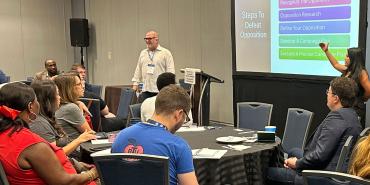In a power-packed strategy session Saturday morning at AFT TEACH, “Surviving and Thriving: Leadership and Organizing Amid Anti-Union Attacks,” the war stories came thick and fast from Karla Hernandez-Mats, an AFT vice president and past president of the United Teachers of Dade (Fla.), and Jeffrey Garcia, a UTD political strategist.
You know the vile attacks against public education we’re seeing from the Trump administration? Florida has been dealing with those attacks from many of the same players—including U.S. Attorney General Pam Bondi and U.S. Secretary of State Marco Rubio—for more than 20 years, the two told AFT activists from across the country.
Whether it’s banning books, whitewashing history, censoring teachers or defunding schools, Florida is a pioneer. It also bears the “deplorable” distinction of ranking among the lowest states for funding education, they said.
To fight back, Hernandez-Mats says, “We threw salt in their cuts and lemon in their eyes.”
Despite an uphill battle for Florida’s public schools, the two cited their victory in a county referendum that brought millions of dollars in raises for Miami-Dade teachers and staff. UTD also won an intense fight against union decertification, said Hernandez-Mats, a former special education middle school teacher.
Execute the plan
The union pulled off these victories against extremist conservatives through focused opposition research, planning and execution, said Hernandez-Mats.
Garcia, who has directed more than a half dozen winning congressional races, described how, in early 2023, union leaders started to realize there was a concerted effort by the conservative Freedom Foundation to attack UTD. He discovered that the foundation was looking to recruit local anti-union operatives, so he sent a “union brother” to attend its conference in Colorado.
It was a worthwhile trip. The foundation had created a front group called the Miami-Dade Education Coalition that would spend more than $2 million to try to decertify UTD.
“Any kind of campaign, any kind of campaign, your best early investment is in opposition research,” Garcia said. “Define your opponent before they can define you.”
The union fought back over six months, campaigning against opt-out letters and rigorously counting “union yes” votes.
To win, Garcia said, you must execute your plan; you can be flexible and change it, but follow it. Count your votes by incessantly calling and texting every dues-paying member and organizing through your stewards at every worksite. UTD even had members photograph their ballots and send them to their stewards.
In addition to this internal organizing, UTD also ran ads, mailed fliers and gave media interviews. Union leaders met with allies monthly and visited churches, speaking during services to connect with families. “They trust us,” Garcia said.
To maintain momentum, members put out a weekly newsletter, stewards used schools’ public address systems to deliver scripted messages, and every Friday members shared a win.
Garcia encouraged local leaders to create accountability for their campaigns, even though the stewards are volunteers. “You have to execute with precision,” he advised. “You can’t just visit sites and high-five.”
“Use your national union,” Hernandez-Mats said. “The AFT had our back.”
Hernandez-Mats and Garcia offered advice for any campaign:
- Establish your vision and purpose.
- Maintain strong, inclusive communications; UTD’s good relations with media took years to cultivate.
- Practice member-centered organizing.
- Remain resilient in the face of opposition; stay composed, calm and cool.
- Anticipate and counteract any anti-union propaganda.
- Build and preserve unity; one ally put a sign on her front door: “No soliciting from fake, anti-union groups.”
- Have T-shirts made and wear them.
- Mobilize through meetings and rallies. People want to be activated.
- Make sure you have legal defense ready.
- Keep using words your opposition tells you not to use.
- Organize, organize, organize.
By the end of the session, the room full of local leaders said that in today’s political climate, they feel angry, fearful, disappointed and frustrated—but also fired up, determined, motivated and ready to fight.
“You’re going to feel these feelings,” Hernandez-Mats said, adding: “Organize at your worksite. Be the winners.”
[Annette Licitra]

